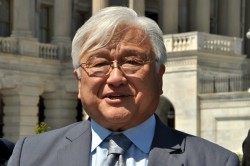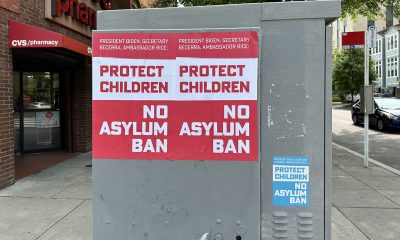National
UAFA-inclusive family immigration bill introduced
Bill enables gay Americans to sponsor foreign partners for residency

A U.S. House member from California on Thursday introduced family immigration legislation that includes language allowing gay Americans to sponsor their foreign partners for residency in the United States.
Rep. Mike Honda (D-Calif.) introduced the Reuniting Families Act, which has a provision that would protect bi-national same-sex couples as one of its six prongs to keep families together in the country.
During a conference call Thursday, Honda touted his legislation as a means to make U.S. immigration policy more fair for gay Americans and their foreign partners.
“RFA also ends discrimination in our immigration system by allowing same-sex permanent partners to sponsor their foreign national partners for immigration benefits,” Honda said.
The provision allowing gay Americans to sponsor their foreign partners for residency in the United States is identical to other legislation known as the Uniting American Families Act, which is sponsored by Rep. Jerrold Nadler (D-N.Y.) in the House and Sen. Patrick Leahy (D-Vt.) in the Senate.
Rachel Tiven, executive director for Immigration Equality, praised Honda for including a provision for bi-national same-sex couples as part of his legislation.
“Separating families has an enormously expensive impact, it is a drain on the economy and separating Americans from their loved ones and forcing them to move abroad because they can’t keep their family together in this country is simply pointless,” Tiven said.
In addition to including UAFA-like language, Honda’s legislation would help shorten the wait times that can keep legal immigrants and their overseas loved ones separated for years. The bill would classify spouses and children of permanent U.S. residents as “immediate relatives” and exempt them from numerical caps on immigration.
“The reality is almost 6 million people are stuck the log jam of our family visa system,” Honda said. “The current system has not been updated in over 20 years, and many family members who apply for visas are not granted admission for decades — and that undermines their economic contributions to our country and encourages some frustrated relatives to resort to illegal migration.”
The Reuniting Families Act has 73 co-sponsors, including House Minority Leader Nancy Pelosi (D-Calif.) as well as gay Reps. Barney Frank (D-Mass.), Tammy Baldwin (D-Wis.) and Jared Polis (D-Colo.). The co-sponsors are all Democrats; no Republicans have signed on in support.
Rep. David Cicilline, another gay lawmaker, isn’t among the co-sponsors. His office didn’t respond on short notice to explain why his name isn’t on the list of supporters.
During the conference call, Honda said he intends his legislation to be a marker to set the tone for debate on larger comprehensive immigration reform legislation in the 112th Congress. President Obama is set to give a speech on Tuesday calling for the passage of legislation to reform U.S. immigration code.
“It’s to also tell our citizens and those with legal permanent resident status to be part of the movement for a comprehensive package for everyone in this country,” Honda said. “I’d like to make sure that we just go through the arc once and just fix all the holes and make sure that this thing we call immigration system … is a better vessel for people that we’re trying to care of.”
Until comprehensive immigration reform can be passed, Honda called on Obama to issue a moratorium to stop the deportation of foreign nationals in same-sex unions who would eligible for married-based green cards if not for the Defense of Marriage Act.
“The president has at his disposal certain kinds of statutory existing powers that he can stay a deportation process,” Honda said. “He can put in a place a situation where folks will be held in abeyance and allowed to work and allowed to continue their lives until such time that we correct our immigration system.”
Last month, Honda was among the 47 U.S. House members, who, along with Rep. Zoe Lofgren (D-Calif.), wrote the Justice Department and Department of Homeland Security Meanwhile to stop the deportations of foreigners in legally recognized same-sex marriages in the United States.
In the 111th Congress, Sen. Robert Menendez (D-N.J.) sponsored the Senate version of the Reuniting Families Act, but he has yet to introduce this bill this year.
The version of the bill that Menendez previously introduced didn’t include a provision for bi-national same-sex couples, although the legislation was similar in other respects to Honda’s bill. However, at the end of last year, Menendez introduced larger comprehensive immigration reform legislation in which the both the Reuniting Families Act and the Uniting American Families Act were provisions.
Menendez’s office didn’t respond by deadline to a request to comment when the senator would reintroduce the Reuniting Families Act or whether it would include a provision to keep bi-national same-sex couples together in the United States.
Steve Ralls, a spokesperson for Immigration Equality, said he thinks Menendez will likely again introduce comprehensive legislation this Congress that would include both Uniting American Families Act and the Reuniting Families Act.
“Sen. Menendez would be the best person to talk about the Senate CIR strategy, but my expectation is that we will see an inclusive, all-encompassing Senate bill which incorporates the various other bills, such as UAFA and RFA, into one,” Ralls said.
State Department
State Department releases annual human rights report
Antony Blinken reiterates criticism of Uganda’s Anti-Homosexuality Act

Secretary of State Antony Blinken on Monday once again reiterated his criticism of Uganda’s Anti-Homosexuality Act upon release of the State Department’s annual human rights report.
“This year’s report also captures human rights abuses against members of vulnerable communities,” he told reporters. “In Afghanistan, the Taliban have limited work opportunities for women, shuttered institutions found educating girls, and increasing floggings for women and men accused of, quote, ‘immoral behavior,’ end quote. Uganda passed a draconian and discriminatory Anti-Homosexuality Act, threatening LGBTQI+ individuals with life imprisonment, even death, simply for being with the person they loved.”
Ugandan President Yoweri Museveni last May signed the law, which contains a death penalty provision for “aggravated homosexuality.”
The U.S. subsequently imposed visa restrictions on Ugandan officials and removed the country from a program that allows sub-Saharan African countries to trade duty-free with the U.S. The World Bank Group also announced the suspension of new loans to Uganda.
Uganda’s Constitutional Court earlier this month refused to “nullify the Anti-Homosexuality Act in its totality.” More than a dozen Ugandan LGBTQ activists have appealed the ruling.
Clare Byarugaba of Chapter Four Uganda, a Ugandan LGBTQ rights group, on Monday met with National Security Council Chief-of-Staff Curtis Ried. Jay Gilliam, the senior LGBTQI+ coordinator for the U.S. Agency for International Development, in February traveled to Uganda and met with LGBTQ activists who discussed the Anti-Homosexuality Act’s impact.
“LGBTQI+ activists reported police arrested numerous individuals on the basis of their sexual orientation or gender identity and subjected many to forced anal exams, a medically discredited practice with no evidentiary value that was considered a form of cruel, inhuman, and degrading treatment and could amount to torture,” reads the human rights report.
The report, among other things, also notes Ugandan human rights activists “reported numerous instances of state and non-state actor violence and harassment against LGBTQI+ persons and noted authorities did not adequately investigate the cases.”
Report highlights anti-LGBTQ crackdowns in Ghana, Hungary, Russia
Ghanaian lawmakers on Feb. 28 approved the Promotion of Proper Human Sexual Rights and Ghanaian Family Values Bill. The country’s president, Nana Akufo-Addo, has said he will not sign the measure until the Ghanaian Supreme Court rules on whether it is constitutional or not.
The human rights report notes “laws criminalizing consensual same-sex sexual conduct between adults” and “crimes involving violence or threats of violence targeting lesbian, gay, bisexual, transgender, queer or intersex persons” are among the “significant human rights issues” in Ghana.
The report documents Hungarian Prime Minister Viktor Orbán and members of his right-wing Fidesz party’s continued rhetoric against “gender ideology.” It also notes Russia’s ongoing crackdown against LGBTQ people that includes reports of “state actors committed violence against LGBTQI+ individuals based on their sexual orientation or gender identity, particularly in Chechnya.”
The report specifically notes Russian President Vladimir Putin on July 24 signed a law that bans “legal gender recognition, medical interventions aimed at changing the sex of a person, and gender-affirming care.” It also points out Papua New Guinea is among the countries in which consensual same-sex sexual relations remain criminalized.

The Cook Islands and Mauritius in decriminalized homosexuality in 2023.
The report notes the Namibia Supreme Court last May ruled the country must recognize same-sex marriages legally performed outside the country. The report also highlights the Indian Supreme Court’s ruling against marriage equality that it issued last October. (It later announced it would consider an appeal of the decision.)
Congress requires the State Department to release a human rights report each year.
The Biden-Harris administration in 2021 released a memorandum that committed the U.S. to promoting LGBTQ+ and intersex rights abroad.
The full report can be read here.
National
Same-sex couples vulnerable to adverse effects of climate change
Williams Institute report based on Census, federal agencies

A new report by the Williams Institute at the UCLA School of Law finds that same-sex couples are at greater risk of experiencing the adverse effects of climate change compared to different-sex couples.
LGBTQ people in same-sex couple households disproportionately live in coastal areas and cities and areas with poorer infrastructure and less access to resources, making them more vulnerable to climate hazards.
Using U.S. Census data and climate risk assessment data from NASA and the Federal Emergency Management Agency, researchers conducted a geographic analysis to assess the climate risk impacting same-sex couples. NASA’s risk assessment focuses on changes to meteorological patterns, infrastructure and built environment, and the presence of at-risk populations. FEMA’s assessment focuses on changes in the occurrence of severe weather events, accounting for at-risk populations, the availability of services, and access to resources.
Results show counties with a higher proportion of same-sex couples are, on average, at increased risk from environmental, infrastructure, and social vulnerabilities due to climate change.
“Given the disparate impact of climate change on LGBTQ populations, climate change policies, including disaster preparedness, response, and recovery plans, must address the specific needs and vulnerabilities facing LGBTQ people,” said study co-author Ari Shaw, senior fellow and director of international programs at the Williams Institute. “Policies should focus on mitigating discriminatory housing and urban development practices, making shelters safe spaces for LGBT people, and ensuring that relief aid reaches displaced LGBTQ individuals and families.”
“Factors underlying the geographic vulnerability are crucial to understanding why same-sex couples are threatened by climate change and whether the findings in our study apply to the broader LGBTQ population,” said study co-author Lindsay Mahowald, research data analyst at the Williams Institute. “More research is needed to examine how disparities in housing, employment, and health care among LGBT people compound the geographic vulnerabilities to climate change.”
Read the report
Federal Government
Lambda Legal praises Biden-Harris administration’s finalized Title IX regulations
New rules to take effect Aug. 1

The Biden-Harris administration’s revised Title IX policy “protects LGBTQ+ students from discrimination and other abuse,” Lambda Legal said in a statement praising the U.S. Department of Education’s issuance of the final rule on Friday.
Slated to take effect on Aug. 1, the new regulations constitute an expansion of the 1972 Title IX civil rights law, which prohibits sex-based discrimination in education programs that receive federal funding.
Pursuant to the U.S. Supreme Court’s ruling in the landmark 2020 Bostock v. Clayton County case, the department’s revised policy clarifies that discrimination on the basis of sexual orientation and gender identity constitutes sex-based discrimination as defined under the law.
“These regulations make it crystal clear that everyone can access schools that are safe, welcoming and that respect their rights,” Education Secretary Miguel Cardona said during a call with reporters on Thursday.
While the new rule does not provide guidance on whether schools must allow transgender students to play on sports teams corresponding with their gender identity to comply with Title IX, the question is addressed in a separate rule proposed by the agency in April.
The administration’s new policy also reverses some Trump-era Title IX rules governing how schools must respond to reports of sexual harassment and sexual assault, which were widely seen as imbalanced in favor of the accused.
Jennifer Klein, the director of the White House Gender Policy Council, said during Thursday’s call that the department sought to strike a balance with respect to these issues, “reaffirming our longstanding commitment to fundamental fairness.”
“We applaud the Biden administration’s action to rescind the legally unsound, cruel, and dangerous sexual harassment and assault rule of the previous administration,” Lambda Legal Nonbinary and Transgender Rights Project Director Sasha Buchert said in the group’s statement on Friday.
“Today’s rule instead appropriately underscores that Title IX’s civil rights protections clearly cover LGBTQ+ students, as well as survivors and pregnant and parenting students across race and gender identity,” she said. “Schools must be places where students can learn and thrive free of harassment, discrimination, and other abuse.”
-

 South America4 days ago
South America4 days agoDaniel Zamudio murderer’s parole request denied
-

 Maryland5 days ago
Maryland5 days agoMontgomery County police chief discusses arrest of trans student charged with planned school shooting
-

 Commentary5 days ago
Commentary5 days agoWorld ‘isn’t much different today’
-

 State Department19 hours ago
State Department19 hours agoState Department releases annual human rights report










